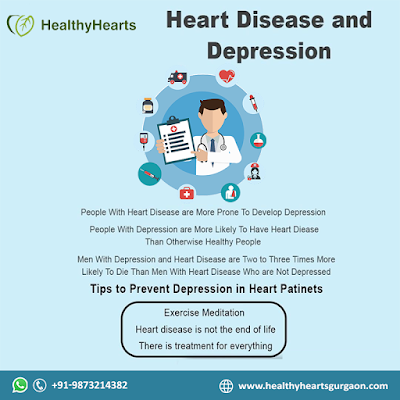Heart disease is a major health
concern globally, and India is no exception. Many of us have heard stories from
our elders about relatives who suffered from heart issues or other heart-related
issues. These stories might make us wonder: "Am I at risk of heart attack
because of my family history?” We can protect our heart health by taking
preventive steps if we know the link between heart problems and relative
history. Consulting the best
heart doctor in gurgaon can provide insights and personalized advice.
What is
Heart Disease?
Many
different heart-related illnesses are included under the umbrella term
"heart attack". Heart
failure, arrhythmias (irregular heartbeats), coronary artery disease, and other
conditions are among them. The most common type is
coronary artery disease, which happens when the blood vessels supplying blood
to the heart become narrow or blocked. This can lead to chest pain (angina),
heart issues, and other serious problems.
The Role of
Family History
Bloodline history plays a
significant role in determining one's risk of heart problems. If your parents,
siblings, or grandparents have had cardiovascular disease, you might be more
likely to develop it too. A mix of common lifestyle variables and genetics
probably accounts for this increased risk.
Genetic
Factors
Genes are the basic units of
heredity, passed down from parents to children. They can influence various
aspects of our health, including the likelihood of developing cardiac disease.
Certain genetic mutations can increase cholesterol levels, blood pressure, and
other risk factors for coronary artery disease. For example, a condition called
familial hypercholesterolemia is caused by a genetic mutation that leads to
very high cholesterol levels and early heart failure.
Early
Warning Signs
Being aware of the early warning
signs of heart problems can help you seek medical attention promptly. Some
common symptoms include:
- Chest pain or discomfort
- Shortness of breath
- Palpitations or irregular heartbeats
- Fatigue or weakness
- Your legs, ankles, or feet are swelling.
If you find these sorts of
symptoms are present, be sure to see your doctor right away. It causes you to
consult your doctor immediately when you experience any of these symptoms, you
might consider consulting Monik
Mehta, who provides the best heart care.
Shared
Lifestyle Habits
Families often share lifestyle
habits that can impact heart health. These include diet, physical activity
levels, and smoking habits. For instance, if your family consumes a diet high
in unhealthy fats and sugars, you might be more prone to developing cardiac
disease. Similarly, if physical inactivity or smoking is common in your family,
these habits can increase your risk.
Other Risk
Factors
Although a significant
influence, relatives history is not the sole one. Other cardiovascular disease
risk factors include:
- Age: Risk
increases with age.
- Gender: Men
are generally at higher risk, but women's risk increases after menopause.
- High Blood Pressure: The heart is strained
more as a result.
- High Cholesterol: It
may also eventually harden into plaque in the arteries.
- Diabetes: High blood sugar may
damage blood vessels.
- Obesity:
Excess weight increases the burden on the heart.
- Stress:
Chronic stress can harm the heart.
- Unhealthy Diet:
Diets high in saturated fats, trans fats, and cholesterol can increase
risk.
- Lack of Physical Activity:
Regular exercise is crucial for heart health.
Assessing
Your Risk
The first step in assessing your risk is
understanding your ancestry. To find out more about your family's cardiac
issues, have a conversation with them. Please record the age at when they were
diagnosed, since early onset of coronary artery disease in close relatives may
be a more accurate indicator of inherited risk.
Preventive
Measures
While you can't change your
genes, you can adopt healthy habits to lower your risk of cardiac disease. The
following are some of the tips you can achieve:
1. Maintain a Healthy Diet: Consume a balanced diet rich
in whole grains, fruits, vegetables, lean meats, and healthy fats. Limit the amount of sugar, salt, trans fats,
and saturated fats you consume.
2. Exercise Regularly: Every week, try to get in 150 or 75 minutes of vigorous or
moderate-to-intense activity. Exercises that are good for the heart include
cycling, swimming, walking, and running.
3. Monitor Your Health: Monitor Your Blood Pressure,
Cholesterol, and Blood Sugar. Regular checkups can also help identify issues
while they are still small.
4. Quit Smoking: Seek support to help you quit
smoking. Smokers are more prone to get coronary artery disease.
5. Manage Stress: Practice stress-relief
techniques like yoga, meditation, deep breathing, or hobbies that you enjoy.
6. Limit Alcohol: Drinking alcohol in moderation
if you have high blood pressure. In older men, prolonged excessive drinking is
linked to a higher risk of cardiovascular disease and is a risk factor for
hypertension.
7. Stay Informed: Educate yourself about
cardiovascular disease and stay updated on new research and recommendations.
Conclusion
The mere fact that heart failure runs in your
family does not guarantee that you will have it. Making good lifestyle choices
and being aware of your risk of heart attack may help you significantly lower
your risk. Remember, knowledge is power. Your heart
now is the first step towards a better tomorrow. For personalized advice and
treatment, consider consulting heart specialist doctor in gurgaon.
Taking proactive steps towards a healthier lifestyle benefits your heart and
enhances your overall well-being. Start making changes today for a healthier,
happier tomorrow.
To book an appointment with our
cardiologist: Dr. Monik Mehta (MBBS, MD, DM, FACC)
Interventional Cardiologist, Cardiologist, Cardiac Electrophysiologist
24*7 Helpline No.: +91–9873214382
Email: heartcare@healthyheartsgurgaon.com

.png)




